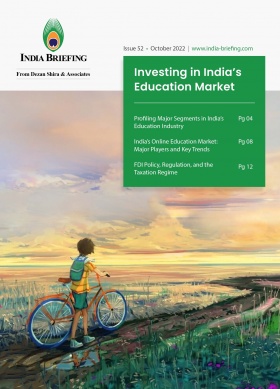India-Australia Forge Stronger Bonds: Migration and Mobility Pact Strengthens Ties
India and Australia have entered into a migration and mobility partnership pact that guarantees fresh opportunities for professionals, including the provision of work visas and the extension of business visas. Besides labor mobility issues, the two countries are also cooperating across various other sectors, in particular trade facilitation following the ECTA coming into force end of 2022. We discuss some of the recent developments in the bilateral relationship in this article.
India and Australia have further strengthened their ties with the signing of a migration and mobility pact during Indian Prime Minister Narendra Modi’s latest visit to Australia on May 24, 2023.
The agreement aims to facilitate the movement of students, academics, and professionals between the two countries, promoting educational and professional opportunities between the two regions.
In this article, we discuss the latest developments, continued bilateral efforts and key areas of cooperation between India and Australia.
Migration and mobility pact
Australian Prime Minister Anthony Albanese expressed his satisfaction with the signing of the India-Australia migration and mobility partnership agreement during a joint press briefing in Sydney.
This agreement intends to encourage the exchange of students, graduates, researchers, and businesspeople, which will strengthen people-to-people connections between both regions.
Acknowledging the significance of this visit, which marked the sixth meeting between the two leaders since Albanese assumed office in May 2022, he also welcomed India’s decision to establish a consulate in Brisbane.
This adds to the existing consulates in Perth, Melbourne, and Sydney, which shall further result in bolstering the diplomatic ties. Meanwhile, Australia intends to open a new consulate in Bengaluru, Karnataka in 2023, which would be the country’s fifth diplomatic office in India.
How the India-Australia migration and mobility partnership pact works
Per reporting in the media, under the India-Australia migration and mobility partnership pact, graduates from Indian tertiary institutions who are on a student visa in Australia will now have the opportunity to work and enhance their professional development without requiring visa sponsorship for a maximum duration of eight years. The implementation of this scheme is scheduled to commence on July 1 of this year.
As part of this program, a pilot initiative called MATES (Mobility Arrangement for Talented Early-professionals Scheme) will be introduced, with an annual limit of 3,000 spots available for a period of four years. MATES aims to establish a fresh pathway for Indian graduates and early career professionals who possess expertise and skills in specific areas of study, allowing them to reside and work in Australia for up to two years.
According to reports, the initial list of eligible educational qualifications encompasses disciplines, such as renewable energy, mining, engineering, information and communication technology (ICT), artificial intelligence (AI), financial technology (FinTech), and agricultural technology (AgriTech). Additional fields may be included in the future through the collaboration of a joint working group.
Cooperation and collaboration on various potential sectors
Modi and Albanese expressed optimism regarding the progress made in the negotiations for an India-Australia Comprehensive Economic Partnership Agreement (CEPA). The two leaders emphasized their commitment to furthering cooperation in multiple areas, such as:
- Defence and security
- Critical minerals
- Technology and innovation
- Education
- Services sector collaboration
- People-to-people connections
Trade and recent developments between both the countries
Bilateral relations between India and Australia have witnessed a remarkable transformation in recent years, as both countries have recognized potential for cooperation in several sectors and the complementary strengths of their respective economies.
With shared democratic values, a commitment to multilateralism, and growing economic ties, India and Australia have been working towards deepening their partnership for mutual benefit.
Trade facilitation
India is Australia’s sixth largest trading partner with two-way trade in goods and services being valued at US$46.5 billion in 2022.
India-Australia relations have been elevated to a Comprehensive Strategic Partnership and the India-Australia Economic Cooperation and Trade Agreement (ECTA) entered into force on December 29, 2022.
During his visit to India in March this year, PM Albanese announced an ‘Australia-India education qualification recognition mechanism’ [Mutual Recognition of Educational Qualifications or MREQ]. Further, Deakin University will be the first overseas university approved to set up an international branch campus in India.
The two countries hope to conclude their discussions to a comprehensive trade deal by the end of 2023.
Impact of the ECTA
In the realm of economic collaboration and trade partnership, the ECTA is a major step forward.
Under the ECTA, 96 percent of Indian goods exports can enter Australia duty-free. It removes tariffs on over 85 percent of Australian goods exports to India, which over the course of the next five years shall reach to 90 percent. This creates fresh trade prospects for enterprises doing business with both economies, in manufacturing and export-import trade.
The India-Australia ECTA holds significant potential, but its implementation may encounter certain challenges. Variations in regulations, market dynamics, and intellectual property rights could create obstacles to achieving smooth trade and investment flows between the two countries. Nevertheless, India and Australia have consistently shown their dedication to surmounting these challenges by engaging in joint initiatives, dialogues, and providing institutional support.
Establishment of Centre for Australia-India Relations
Established in 2023, the Center for Australia-India relations is a national platform established by Australia to bring together all levels of its government, together with industry and the broader community, to drive Australia-India engagement.
The Center’s work will be focused on the below key areas:
- Promotion of policy dialogue
- Engaging with Indian communities to support bilateral relationships
- Deepening cultural connections and mutual understanding
- Building India business links and literacy
Inaugural Advisory Board and Maitri programs
On May 23, 2023, the inaugural advisory board for the Centre for Australia-India relations was announced.
Various programs were also launched to deepen and grow education, cultural, and policy connections between India and Australia. These will support sectoral collaboration, creative exchange, scholarships, policy discourse, and promote greater market understanding for Australian businesses.
Accordingly, there are four separate Maitri (meaning “Friendship” in Sanksrit) programs:
- Maitri Cultural Partnerships
- Maitri Grants
- Maitri Fellowships
- Maitri Scholars Program
India-Australia Hydrogen Task Force
The two countries have finalized the terms of reference for an India-Australia hydrogen task force, which will examine the potential opportunities in the field of green hydrogen. This task force will report to the ministerial dialogue and contribute to both countries’ efforts to achieve their respective energy targets while supporting global emission reductions.
Mutual commitment to a strong India-Australia bilateral relationship
India and Australia are committed to deepening their bilateral relationship, as evidenced by recent developments. These include the signing of a migration partnership agreement, the establishment of an additional consulate, and the formation of a hydrogen task force. The Foreign ministers S Jaishankar and Penny Wong have also met to discuss these matters.
India and Australia are focused on economic collaboration, defence and security cooperation, education and research, technology and innovation, and people-to-people ties. The partnership is poised to expand and evolve in the future.
The bilateral relationship holds significant importance in the changing geopolitical landscape, and both India and Australia aim to secure peace, stability, and prosperity in the Indo-Pacific region and beyond.
Lastly, the close ties between India and Australia will positively contribute to global efforts in sustainable energy solutions and international cooperation in education and research.
About Us
India Briefing is produced by Dezan Shira & Associates. The firm assists foreign investors throughout Asia from offices across the world, including in Delhi and Mumbai. Readers may write to india@dezshira.com for more support on doing business in India.
We also maintain offices or have alliance partners assisting foreign investors in Indonesia, Singapore, Vietnam, Philippines, Malaysia, Thailand, Italy, Germany, and the United States, in addition to practices in Bangladesh and Russia.
- Previous Article What You Need to Know About Conducting Due Diligence in India: Q&A
- Next Article BRICS Update: Promoting Local Currency Usage in International Trade, Opposing Unilateral Actions









